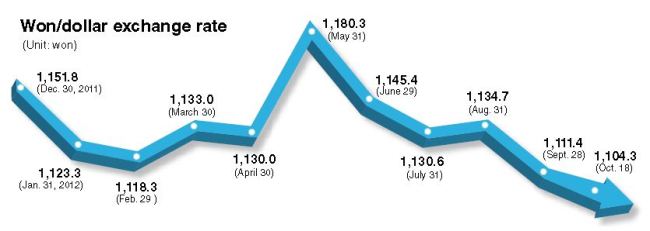Korean currency gains value against dollar rapidly compared to other foreign currencies
Concerns are rising that companies’ global competitiveness may be weakened as the U.S. dollar recently lost ground against the Korean won, amid the eurozone woes.
The possibility that the Korean currency will rise in value up to nearly 1,000 won against the dollar is growing with the recent strenghtened position of the won after quantitative easing by the U.S. government.
The dollar slid again to 1,104.3 won on Thursday, compared with 1,114.4 won at the end of September and 1,134.7 won at the end of August.
The Korean currency posted a 4.2 percent appreciation against the dollar so far this year, surpassing the appreciation rate of other major currencies ― British pound with 3.7 percent, euro with 0.9 percent and Chinese yuan with 0.8 percent.

In contrast, Japanese products are gaining price competitiveness in the overseas market as the yen lost value against the greenback by 1.4 percent this year.
When the won appreciates by 1 percent against the dollar, the nation must suffer a drop of $520 million in its current account surplus and 0.72 percent in gross domestic product growth, according to economists at the Bank of Korea.
The latest fiscal woes in Europe and the U.S. are expected to invite wider skepticism on the efficacy of the Group of 20 meetings despite pledges from the G20 members to collaborate on weathering global economic difficulties.
It was the 2008 global financial crisis that highlighted the role of the G20, which later decided to hold annual meetings to tackle global financial woes by mapping joint countermeasures among advanced and emerging countries.
The U.S., which had suffered a crisis from insolvent subprime mortgage loans, was one of the biggest beneficiaries of the G20 coordination.
Due to Washington’s cheaper dollar policy, countries such as Korea, Japan, China and Brazil were pushed to engage in a so-called “currency war.”
Though the G20 reached an agreement, including promises to refrain from intervening in the foreign exchange market, during the Seoul Summit in November 2010, it is looking more and more likely that recent woes will shift the consensus.
The U.S. has recently been striving to pull down the value of the dollar to reduce the value of its trade deficit following the eurozone crisis.
Even though European countries are closely monitoring the currency market, the possibility of another currency war is emerging.
An increasing number of global analysts say that the U.S. and Europe have lost the world’s confidence, stressing that these were the regions that initiated the recent crisis. Meanwhile, emerging countries are expected to gamely tackle the agreements that are habitually favorable only to a handful of advanced countries.
Korean officials have already warned that a global currency dispute could resurface to destabilize the global economy and force the local currency to appreciate.
The controversy seemed to subside following the November G20 Summit when the major economies agreed to move toward more market-driven exchange-rate systems and refrain from competitive devaluation of currencies.
Korean policymakers and its central bank, however, point to signs of the disputes returning to the fore as U.S. increases pressure on China to raise the yuan’s value.
By Kim Yon-se (
kys@heraldcorp.com)








